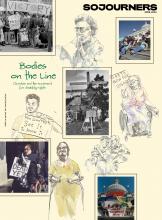
(Top row, from left): Denise and Neil Jacobson, Judy Heumann, Kitty Cone, Dennis Billups. (Bottom row, from left): Mary Lou Breslin, Letiah Fraser, Harold Wilke, Brad Lomax, and Cecil Williams. Illustrations by Indigo Ayling
What's Next for Disability Rights?
ON GOOD FRIDAY 1977, Dennis Billups and Judy Heumann, along with six other disabled activists, were on hunger strike. It was their fourth day occupying the San Francisco Department of Health, Education, and Welfare (HEW) alongside more than 100 protesters. The eight activists did not break their fast three days later when many of their Christian counterparts in the sit-in celebrated Easter. Instead, they continued without food, waiting with hope for their own improbable victory despite seemingly
insurmountable odds.
The 26-day occupation of the HEW building was the longest nonviolent occupation of a federal building in U.S. history. In the early 1970s, disabled people were routinely excluded from public transportation, libraries, and other public spaces. Four out of five disabled children were not enrolled in public education; many states had laws excluding students with disabilities from public schools. The landmark Rehabilitation Act of 1973 prohibited discrimination based on disability in programs conducted by federal agencies, in the employment practices of the federal government and its contractors, and in programs that received federal financial aid. Section 504 of the Rehab Act contained the ban on discrimination against disabled people by recipients of federal funds. Yet four years had passed since 1973, and the Carter administration still had not signed regulations to enforce Section 504. Disabled people were losing patience.
Read the Full Article

Got something to say about what you're reading? We value your feedback!


